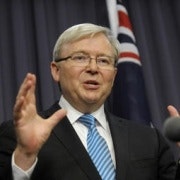Why Abbott needs to get the knife out
Jeff Kennett got it dead right when he was Opposition Leader in Victoria – he had his transition to government all worked out in the months leading to the election date.
He knew how he wanted government structured. He knew which departmental heads would roll. And he knew – pretty well – who would replace them. He knew he needed an 'inner cabinet' of competent, trusted ministers and not the usual conga line of shadow ministers waiting for the gig. He knew his policy priorities – and they had nothing to do with the pic-fac opportunities rolled out in the formal campaign.
He knew he needed to do big things, and quickly – because the state was stuffed.
He engaged a respected bureaucrat to drive this process, unheralded.
He also knew for certain that this serious transition work had to be carried out well away from public glare. Hubris is a minus in politics.
It all happened last century, of course, but the principle remains the same today for any government in waiting.
Tony Abbott is the prime minister in waiting – ably assisted by a government obsessed with its entrails and its former leader, and an accompanying political brand in tatters.
He therefore has no choice but to be prepared – not to win, but to govern. The reality of modern electoral cycle means Australia can't afford its government to waste a day.
It means that Abbott must have his plans, people, and priorities in place from day one.
The election date coincides with football finals. The Spring Racing Carnival and the wind-down to Christmas is then swiftly upon us. It would be tempting to just ease into government over that time and come out on the front foot in the New Year. That would be a mistake.
First, Abbott will need a core group of ministers to form an inner cabinet. These ministers will be focussed tightly on key public policy priorities. He can still have a cabinet of more than 20, but that is a lumbering beast when it comes to deft decision making.
Second, strict priorities for this cabinet will have been worked out in the next seven months – in detail. They should include issues of over-governance, the massive (and under used) opportunities that Australia offers in agriculture exports to Asia, the future of middle class welfare and questions of regulatory reform.
Third, he won't have the luxury of having the wrong ministers in key portfolios. For example, he will have to make real use of Malcolm Turnbull – as Treasurer – and Arthur Sinodinos and Jamie Briggs. Already, he's signalled that all shadow ministers will remain in their portfolios and become ministers. If that happens, it will be his first big mistake as his front bench is scattered with B-grade has-beens.
Fourth, he will need to look closely at the public service heads now in place and make some tough decisions – especially in the key economic departments, including the Department of the Prime Minister. Kennett moved in this area within 48 hours of being sworn in.
Abbott says there will be no night of the long knives regarding public service heads. Another mistake, if he retains the status quo.
And finally, he will have to manage his time and resources properly and forget about micro managing portfolios. If ministers stuff up, the buck stops with them, not the prime minister. Abbott would be wise to set aside a few hours each work day in Canberra free from incessant appointments and demands from business and interest groups for access. That time would be his, alone.
Of course much can happen between now and the election.
Abbott will be placed under pressure on policy – more than he faced since the 2010 election. It will come from a desperate and swingeing Labor Party, and maybe, occasionally, from a dwindling scattered few in the media.
He will remain hugely comforted however, that Rupert's tabloids will be cheering him on. We've already learnt from a front page headline that Gillard's move to name an actual election date is a "227 day farce”. I fondly remember when the front pages of newspapers were devoted to news.
That said, Abbott will still need to weave his way through that inescapable day-to-day task of managing his political campaign. He won't take victory as a given. But he knows he has a far more important job – and it happens miles away from the cameras and props.
And he knows precisely the hour and the day that job starts.
Alister Drysdale is a Business Spectator commentator and a former senior advisor to Malcolm Fraser and Jeff Kennett.
















